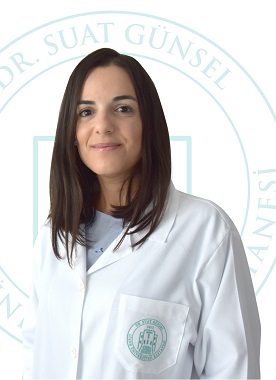
Dr. Suat Günsel University of Kyrenia Hospital Neurology Specialist Pınar Gelener Arsal MD., made a statement on the occasion of 30 May World Multiple Sclerosis Day. Arsal stated that MS is a chronic disease characterised with symptoms which affects the white matter (of the brain and spine) in multiple locations, as well as impacting the immune system. Neurology Specialist Pınar Gelener Arsal MD., stressed that this disease is more commonly observed between the ages of 20-40 but could also occur in other age groups.
Dr. Suat Günsel University of Kyrenia Hospital Neurology Specialist Pınar Gelener Arsal MD., added that MS usually appears and disappears with inflammations and could start with one or more symptoms such as loss of vision, double vision, dizziness, nausea, loss of balance, numbness in the arms and legs as well as lack of strength, speech problems, dizziness, incontinence, urinary problems and sexual problems.
Arsal underlined that magnetic resonance imaging (MRI) is still the gold standard for the diagnosis of MS, while cerebrospinal fluid examinations and evoked cortical potentials are also essential methods. Neurology Specialist Pınar Gelener Arsal MD., stated that MS could mimic many diseases and for correct diagnosis and categorization various examinations should be performed.
Neurology Specialist Pınar Gelener Arsal MD., stated that new scientific data is constantly published about the cause, diagnosis and treatment of this treatable disease and said that: “Injectable therapies are used since 1995 in order to prevent possible disease progression and more recently, group of oral medications have been developed. We have the opportunity to access all medication which has been developed for the treatment of MS simultaneously. If the disease cannot be controlled, monthly medications and secondary stage oral medications are also available. “
“MS is not a contagious or hereditary disease “
Dr. Suat Günsel University of Kyrenia Hospital Neurology Specialist Pınar Gelener Arsal MD., continued her statement by saying: “Physical therapy and rehabilitation are essential for the treatment of Multiple Sclerosis alongside of medical treatments. Multiple Sclerosis is not considered to be contagious or a hereditary disease. Individuals with MS can continue their careers, social lives, sport activities, and have a baby. Multiple Sclerosis is not a life-threatening disease, but may threaten the patient’s quality of life. However, this disease can be treated. Multiple Sclerosis is not a hopeless or a fatal disease. “